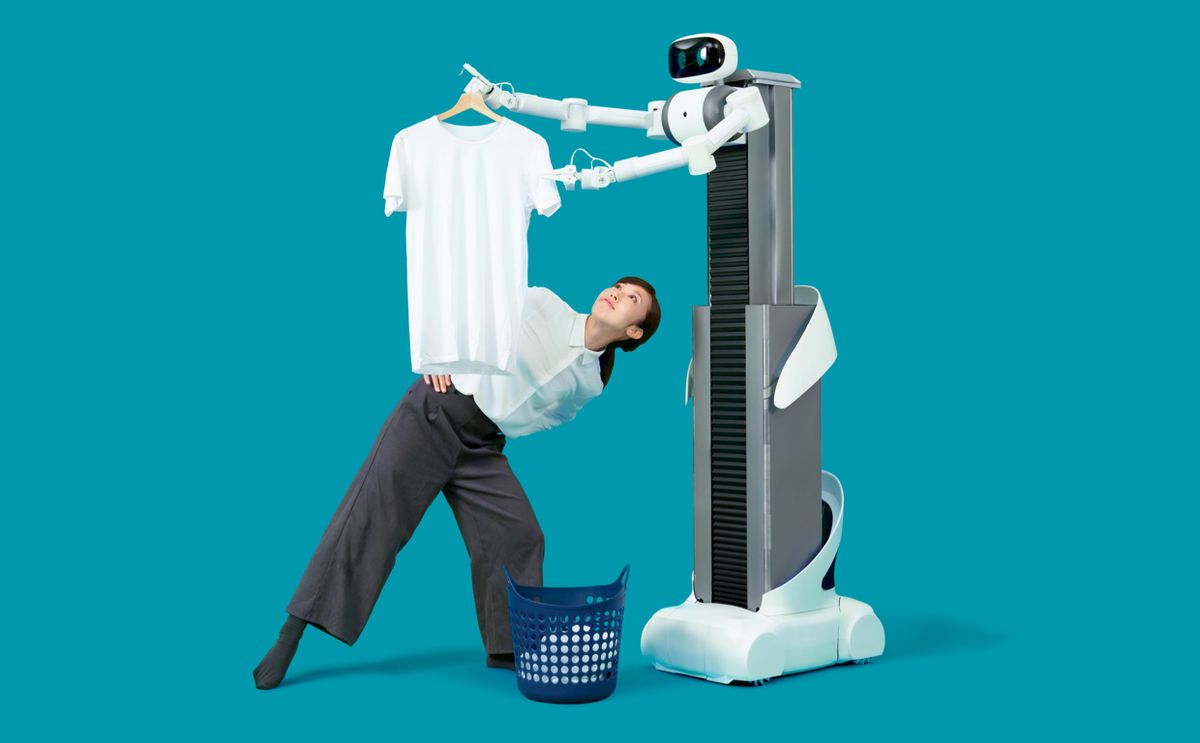Laundry is way, way, way up there on the list of things that people really wish robots could do for them. It’s a very hard problem, though—we’ve (sort of) seen some amount of laundry cycle success in a research environment, and there are robots out there that will fold some of your clothes while taking up a lot of space and probably not working very well, all things considered.
The challenge, as always, is that complex manipulation tasks are very hard for robots, especially when vision is involved and everything gets wrapped up in a semi-structured, non-optimized environment. From that perspective, laundry is a fantastic example of tasks that humans are ideal for but that robots struggle with. A solution to this problem is to just let humans help the robots out—for example, by remotely operating a mobile manipulator in your house to do the laundry for you. That’s exactly what a Japanese startup, Mira Robotics, is going to offer consumers, who’ll be able to rent a robot named Ugo to handle the chore.
Robotstart was there for a demo, and brought back a video that may or may not convince you that you really want one of these.
To be clear, this is not an autonomous robot. Or maybe it is, a little bit, for moving around and stuff, but for the complex manipulation tasks, it’s definitely being teleoperated by a human: For the first minute or so, you can see the operator using a motion controller to grab the towel out of the dryer. For the human, this is a trivial performance, but for a robot to do this autonomously this fast would be mind-blowing.
The robot itself has an impressive reach, and its torso can extend from 1.1 to 1.8 meters. Each arm can lift between 1 and 1.5 kilograms, which is significantly more than the weight of a damp bath towel (about 800 grams), the heaviest thing the robot is likely to have to lift. It’s got three cameras, a microphone and speaker, and both Wi-Fi and LTE connectivity. It can’t handle steps, but Mira figures you’ll just install a little ramp if you need one, which I guess isn’t entirely unreasonable.
Mira’s business plan with Ugo is that you’ll rent one that lives in your house for somewhere between US $180 and $225 per month, with the expectation that you’ll want it to be doing housework for several hours each week. You request that the robot complete a task, and a “professional operator” will connect to the robot and get to work, disconnecting when they’re finished. Mira says that you get the same benefits of having someone in your house doing chores for you, without having to actually have someone in your house.

Privacy is still a concern, of course, and it’s something that Mira attempts to address. Yes, you have a robot with a camera and a microphone and a person on the other end inside your house, but it’s taking the place of an actual person, and from that perspective, it’s already more privacy conscious. The robot can be confined to a specific area and never has to see any other part of your home, and Mira has a system that blanks out text to help keep your documents private. You can also monitor everything that the robot does through the app, so you don’t even have to be home.
Long term, Mira’s idea is that they’ll accumulate a whole bunch of high quality training data over time, harvested from all the teleoperated laundry folding. At some point, the robot will be able to start doing some tasks autonomously and only ask for help when necessary, and eventually, they hope to transition to full autonomy (an approach being pursued by other startups). That seems optimistic, but I feel like the shorter term idea could be viable, and there might even be a business case for it, since the fixed cost of the robot can be spread out over time, while the recurring costs of the human operators can be spread out over lots of robots all at once.
Mira plans to start beta testing of Ugo in the near future, with full-scale deployment happening in 2020.
[ Mira Robotics ] via [ Robotstart ]
Evan Ackerman is a senior editor at IEEE Spectrum. Since 2007, he has written over 6,000 articles on robotics and technology. He has a degree in Martian geology and is excellent at playing bagpipes.



